- Home
- Terry C. Johnston
Black Sun: The Battle of Summit Springs, 1869 (The Plainsmen Series) Page 8
Black Sun: The Battle of Summit Springs, 1869 (The Plainsmen Series) Read online
Page 8
Cody shook his head. “There isn’t one, General. At least, not something fit for wagons for a good thirty miles in either direction. Thirty miles off … then another thirty getting down to the creek below where we found Penrose’s camp—that means close to a week you’ll lose to lollygagging with these wagons.”
“Lollygagging?” protested wagonmaster John Wilson as he stomped up, curious at the delay. “These are my wagons, by God—and I’ll say what’s done with ’em, General Carr.”
Carr studied the slope a few moments, then looked at Cody. “We’ll gain a week if we drop down to the creek here?”
“Three days off … three days back—six days minimum.”
“You’re taking the word of this boy here, General? I’m not asking my drivers to take a chance on that icy slope!” Wilson complained.
“You don’t have to, Mr. Wilson,” Carr replied. “I’ll have soldiers drive the wagons down if your men won’t tackle that ride.”
Wilson drew back, puffing out his chest. “You’re forgetting, General—these are my wagons.”
Carr stepped right up to the civilian, his feathers ruffled now. “And you’re forgetting, Mr. Wilson—this is an army campaign you’re contracted for. Not some ride in the park. You don’t want to drive your wagons down there, I’ll find someone who will. And, if any are damaged in the process—the army will gladly reimburse you for the cost.”
Wilson sucked on a tooth a moment, thinking on that. “You’ll replace any—”
“He said he would,” Cody interrupted and in a hurry. “Now, you want to take the first ride down that slope—run down, slide down or fall down … it’s your job to get your equipment down, any way you can.”
“I’m not going down that slope with my ass nailed on a wagon seat —any less taking orders from some wet-eared young rake like you, Cody!”
“Then step out of the way, Wilson—’cause I’ll sure as hell take the first seat down that slope, and cut the way for the rest of you.”
Carr turned on his chief of scouts. “You know anything about handling a wagon and team?”
Cody laughed engagingly. “General, for years I ran freight for the top outfit here on the plains.”
“Who was that?” Wilson demanded.
“Russell, Majors and Waddell,” he answered, shutting the wagonmaster up.
Carr waved an arm at the wagonmaster. “Bring up a wagon, Mr. Wilson. We’re going to see how Cody gets this done.”
The wagonmaster brought up the mess wagon which rode at the head of the train, halting it at the lip of the steep slope where the mules wide-eyed the drop below their traces.
Following Cody’s directions, a group of the teamsters brought out their chains and locked the wheels together on one side, then did the same with the second pair. That completed, the young scout leaped onto the seat, heaved forward on the brake and coaxed his reluctant mules down the slope.
Most of the way down the animals kept the wagon in control, working with Cody as he struggled against the icy slope beneath the locked wheels. But nearing the bottom the mess-wagon gradually worked up on the mules so hard that the animals broke into a run, galloping into the snowy valley in a wild ride that caused Cody to yahoo all the way into the bottom. He brought the mess-wagon to a halt beside the creek, leaped off the seat and waved his hat at the top of the hillside.
Soldiers and teamsters alike cheered and stomped and whistled their admiration.
One by one, each wagon was rough-locked and eased down the slope so that within a half hour, Major Carr and wagonmaster Wilson had the entire column in camp, including the two hundred head of cattle.
“Cody, by Jupiter you’ve earned yourself a fresh cup of coffee!” Carr hailed, waving the scout to his fire.
He rubbed his hands over the flames. “Hoping you’d offer me something a bit stronger, General. After that ass-puckering ride, I could sure use something of a bracer.”
Carr finally laughed. “Well, now—I suppose we both can at that, Mr. Cody. And I have something along that just might be strong enough to warm the man within.”
Chapter 7
December 21, 1868
Four days until Christmas.
A damned lot he had to be celebrating. He or any of them out in the middle of this wilderness after another cold, wet snow had battered the land before blowing on east into Indian Territory.
Yet Seamus could not help remembering Christmases past, celebrated in that favorite pub of his back in Boston Towne. The memory of the special smells and the tastes, surrounded by fragrant greenery bound up in bright red ribbons, and the air itself rich with simmering spices and pine tar—just the recollection itself made Donegan as warm inside as if he were sipping at the hot buttered rum that was the pub’s specialty at this merry season.
How he longed now for something thick and potent and bubbling hot.
Instead, he shivered, not knowing if he would ever be warm again.
Slowly moving across the winter countryside, letting his horse pick its own way through the snow and bramble, willow and bunch-grass. Each day like this he joined Bill Cody riding far ahead of Carr’s column. Leaving in the gray of dawn, not riding back until the dark of twilight to the merry fires over which the Fifth Cavalry cooked their supper fare. Without asking, Seamus still knew Cody was feeling his way along more than planning out his route. Sensing through intuition where Penrose’s scouts had taken the buffalo soldiers.
It was a gamble any way a man might choose—especially after the countryside had been battered by storms.
This cold in the saddle—he wondered if it were any worse than the winters in his green homeland back across the ocean. It made him smile wryly, that he still thought of Ireland as his home, when a growing part of him had come to believe he would never make it back to Ireland and County Kilkenny before his mother died. If ever.
It had been a year and a half since he had received that letter from her. Could a woman like her last that long or more? Sure it was that she came from strong stock—just look at those two brothers of hers: Liam and Ian. But still she could be the sort worn down with the woes of life, and the loss of a husband was not the least of these. Could she? Was she …
He squeezed the specter out of his mind, pushing a cold pain from his chest as he struggled to latch his mind to something else.
There’s been no letters since, Seamus. But, then after leaving the Bozeman Road—you’ve not been an easy one for a letter to track down …
“What the hell are you doing out here anyway, you bleeming bastird?” he asked himself out loud, startling himself with his own voice amid all the aching silence of the wilderness that made him yearn all the more for the woman he left behind up the Bozeman Road.* “You ought to be finding Jenny and making it right with her.”
“What’d you say?”
Of a sudden he snapped to, finding Cody stopped ahead of him, turned in his saddle to peer back at Donegan with a truly quizzical look on his frozen face.
“Nothing, Bill,” he muttered. “Just … talking to meself.”
“Like it better if you talk to me—especially you’ve got to talk of women.”
“What’s the use of talking of women out here, where we have none to look at?”
“Ah, Irishman—that’s just it, don’t you see? We don’t have them to look at … but, what do you remember most about the woman who weighs most heavy on your mind?”
He clamped down hard, not sure if he wanted her to have a grip on so big a piece of him right now. Any time. Yet he could not help himself—for if nothing else, it was truly the smell of her, the feel of her, that haunted him now after all this time.
“The smell of her, maybe.”
“Good!” Cody cheered as together they worked their way down a short slope. “Ah, how I remember Lulu’s smell.” He drank deep of the dry, cold air.
It reminded Seamus of a man drinking in a woman’s perfume. He tried it himself, drawing a breath, deep, to the full extent of his chest. Ther
e was a perfume to it at that. And one that reminded him of Jenny. Was it that she smelled so much like this great land? Or, was it simply that he had no other sweet fragrance to prick his thoughts with remembering?
“God, how I miss Lulu,” Cody said, his voice a little softer now, even plaintive. Then he suddenly straightened in the saddle, as if steeling himself against the hurt.
“Where is she now?”
“St. Louis, Seamus. She and my daughter, Arta.”
Donegan remembered the boys. “It’s good to know where your woman is, Bill.”
“You don’t?”
He wagged his head. “Doubt I ever will now. She gave up on waiting for me. Went back to her folks and the life she lived before coming west.”
Bill shrugged. “What do you expect a woman to do?”
Seamus nodded. “Can’t blame her.”
“She gets scared, Seamus—she runs back to those she remembers protecting her.”
“Like your Lulu.”
“Yes,” he sighed. “She doesn’t belong out here—not yet. Not till I can build a decent home for her and the girl.”
“Where you want that to be?”
“Don’t know. So for now, I ride across these plains, doing what a man has to do to make a living. And she lives with her family back East—where we both know it’s safe.”
“Yet I wonder, Bill—is there truly any place safe?”
Cody thought on it, the way a bear would cock its head over the burrow of some animal it was hunting. Listening. Hoping for some sign to continue its pursuit.
“No place truly safe, Irishman. I only hope to find a place for those I love where they can be safer than the way of things out here.”
“Injins?”
“Them, and … others.”
“You don’t fear for them as much from Injins as you do other white men, do you?”
“I know what to count on with an Indian, Seamus. It’s the white man that keeps me wondering some—”
When Cody stopped talking mid-sentence, it snagged Donegan’s attention as if it had been yanked hard with a rope knotted around his middle. The young scout ahead threw up an arm as he reined back. He pointed.
Both strained their eyes ahead, across San Francisco Creek. Finally seeing something to go with the faint noise that had been brought to their ears. The sound of hooves on old, icy snow. And the low, mumbling voices of man.
“Look at them, will you?” Cody said in a whisper, certain at last the two white men had not been spotted.
“Who are they? And what they doing out here?”
Bill snorted. “Don’t you figure it, Irishman?”
He shook his head. “I see two men bundled on horses.”
“But them ain’t Indian ponies, are they?”
“No, they aren’t.” Then it struck him, with the way the two riders were bundled against the cold and hunkered down in the saddle, allowing their big horses to pick their way along the creekbank and snowdrifts. “Are they scouts from Penrose’s column?”
He nodded, grinning. “I don’t doubt it, Irishman! Damn, but won’t the general be happy now?”
Cody turned back in the saddle, looking down the slope at the two riders as they drew nearer, unaware they were watched. Until the young scouts called out.
“Halloo!”
Both riders suddenly jerked back on their reins as they sat up straight in their saddles, heads turning like wind-up toys on a string, this way then that while Cody’s greeting echoed off the hills. They were pulling up the rifles suspended from slings strapped over their shoulders.
“Don’t shoot, boys!” Donegan hollered out this time.
“Over here!” Cody said, waving his big hat.
“Let’s go talk,” Seamus suggested, nudging his horse past Cody’s.
The creek gurgled under their horses’ bellies in an icy flow as the animals carefully stepped across the rocky bottom. By the time they reached the other side, the two buffalo soldiers were coming down to the crossing.
“Buffalo Bill! I’ll be damned, if this don’t beat all!” exclaimed one of the black soldiers. “You riding with Ginnel Carr?”
“That’s right!” Cody replied. “We’re out looking for—”
“You got a nickname, Cody?” Donegan whispered, looking with wonder at his white companion.
“Seems I got one now. And, if you ask me—I take a fancy to it.”
“That’s right, Buffalo Bill,” the first soldier said. “I see’d you shoot a bunch of buffalo up to Fort Hays last year. You was working for the railroad.”
“Damn if I wasn’t. Buffalo Bill—got a nice ring to it, don’t it, Seamus?”
The first buffalo soldier got wide-eyed of an instant, cranking his head to look at the Irishman. “Seamus—that what he called you?”
“Yeah,” Cody replied.
Donegan’s eyes narrowed, studying the black soldier’s face as he pulled down the wool muffler he had wrapped around his own. “By the saints! If it ain’t Reuben Waller himself!”
“Gloreee!” Waller screeched, kicking a right leg over to leap from his saddle.
Donegan dropped to the ground in the next heartbeat, lunging for the buffalo soldier. They met with a thud, pounding each other and dancing about in a cascade of snow, heads reared back and laughing with a sound that spooked some robber jays from the branches overhead.
“I take it you boys know each other?”
Seamus stopped, one arm still clutched around Waller. “Bill, this man probably saw you shoot buffalo last year, before I ever ran onto him at Fort Wallace last fall. I kept some white sojurs from jobbing on him.”
Waller grinned, the teeth bright in his dark face. “He kept them white soldiers from kicking the shit outta ol’ Reuben. Likely they would’a done more’n pound sand up my ass—this tall, ugly Irishman didn’t come along to help me.”
Cody sat hunched over the saddlehorn, watching the reunion. “Don’t that beat all? Out here in the middle of all this, and you bump into a old friend. I’m Bill Cody.” He pulled off a mitten and held down a hand.
Waller shook it enthusiastically. “Proud to make your ’quaintance, Buffalo Bill. This other’n’s Silas. Private Rutt.”
The second soldier nodded and saluted the white men.
Seamus pounded Waller on the back again. “Reuben was in the bunch rescued Forsyth’s scouts, Bill.”
“Captain Carpenter’s orderly, I was.”
“Was?”
“I’ve been assigned to Ginnel Penrose for this winter campaign.”
“I knew it!” Cody cried. “Where’s Penrose?”
Waller waved down San Francisco Creek.
“How far?”
“We been out since yesterday morning,” Waller answered.
“Penrose is staying in camp—not moving?”
“Just squatting,” Waller replied. “He’s sent out patrols to comb the country every day, looking for Carr.”
Donegan turned to the buffalo soldier. “How you fared with Penrose, Reuben?”
“Two hundred head of horses froze on us. No, none of us done good at all.”
“Down to quarter rations,” added Silas Rutt.
“Mither of God!” Seamus exclaimed, twisting ’round and tearing at his saddlebags. “Get these sojurs some food.”
As Waller and Rutt lunged close, the two white scouts pulled hardtack and salt-pork from their own supplies.
“I suppose we can go without till we get back to Carr,” Cody added cheerfully.
Donegan grinned, watching the two hungry soldiers wolf down everything laid in their hands. “Damn right if we can, Buffalo Bill!”
* * *
After retracing their trail back to Carr’s column, carrying word of Penrose’s condition, Cody, Donegan, and the two buffalo soldiers prepared to move back down San Francisco Creek once more.
Carr dispatched Captain William H. Brown and two companies of the Fifth to push ahead, accompanied by fifty pack-mules swaybacked with provisions. T
he senior major would hurry the rest of the command and his wagons as fast as the snowbound countryside would allow.
But for the meantime, Cody would lead the relief column hurrying to lift the specter of starvation from Penrose’s buffalo soldiers.
Two days after running across Waller and Rutt, Bill Cody located the bleak, cheerless camp on Paloduro Creek. Despair-filled, watery-eyed buffalo soldiers loped out to greet their saviors. They hollered with weak, hoarse voices at their deliverance.
“Makes me proud to return the favor I owed you,” Seamus whispered to Waller, who rode at the Irishman’s side into camp. “After you and Carpenter’s boys rescued those of us on that island with Forsyth.* Time I repaid—”
“Hell, you don’t owe me a damned thing,” Waller replied. “I was never more proud to do anything in my life than I was riding with Cap’n Carpenter’s company that day—fixin’ to fight our way into some Cheyennes—then finding what bad shape you fellas was in on Beecher’s Island.”
“We held out. Looks like your sojurs did the same here, Reuben.”
It was the best a man could say about Penrose’s soldiers—that they held out. Skinny and growing more emaciated by the day, they had been on quarter rations for over two weeks, supplementing it with some stringy mule or horse from the few carcasses left in camp. It was plain to see the buffalo soldiers were hungry most for grease—the salt-pork and bacon would do nicely they said as they lunged at the crates of rations like packs of wolves. Mess sergeants stood on the backs of their wagons, tossing out the hard bread to tide both Negro soldiers and the hard-bitten Mexican trackers over until beans and bacon had been cooked.
And coffee. One of the soldiers hollered out in his weakened, husky voice for some hot coffee.
“I could go for a cup myself,” Cody said, sliding from his saddle at the fire Waller chose for their mess.
“You drink about as much coffee as I do, Cody.”
At a nearby fire a gaunt figure turned around to stare back at them, his wide-eyed, skinny face filled with wonder. His mouth yawed a moment before any words came out.
“Cody? That you?”
Bill Cody stopped punching up the coals at his own fire and stared back at the wolfish figure standing not twenty feet away. A white man he was—dressed in a long buffalo coat that nearly reached the ground, atop it all a cap fashioned from the hide of a wolf snugged clear down to his eyebrows. From the bottom of the cap poured the man’s long, dark hair, spilling over his shoulders.

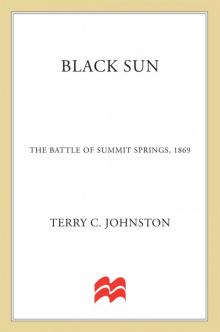 Black Sun, The Battle of Summit Springs, 1869
Black Sun, The Battle of Summit Springs, 1869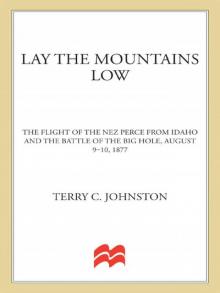 Lay the Mountains Low
Lay the Mountains Low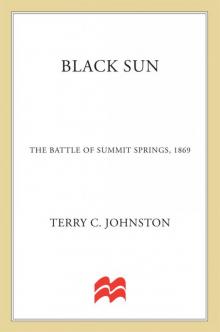 Black Sun: The Battle of Summit Springs, 1869 (The Plainsmen Series)
Black Sun: The Battle of Summit Springs, 1869 (The Plainsmen Series)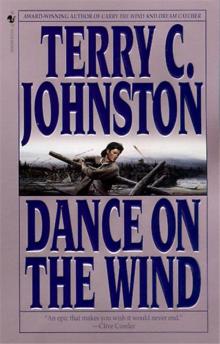 Dance on the Wind tb-1
Dance on the Wind tb-1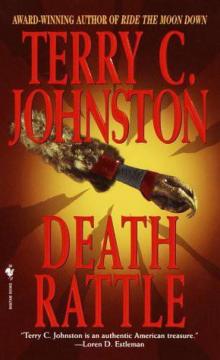 Death Rattle tb-8
Death Rattle tb-8 The Stalkers
The Stalkers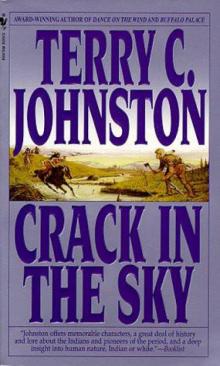 Crack in the Sky tb-3
Crack in the Sky tb-3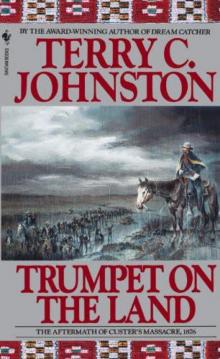 Trumpet on the Land: The Aftermath of Custer's Massacre, 1876 tp-10
Trumpet on the Land: The Aftermath of Custer's Massacre, 1876 tp-10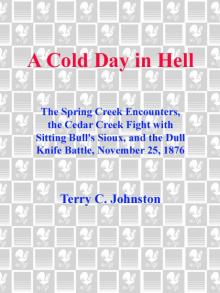 A Cold Day in Hell
A Cold Day in Hell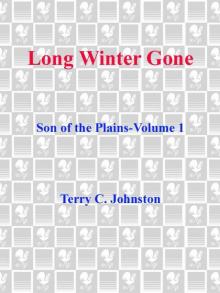 Long Winter Gone: Son of the Plains - Volume 1
Long Winter Gone: Son of the Plains - Volume 1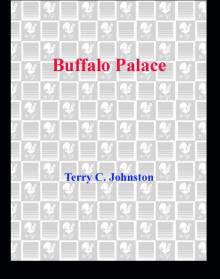 Buffalo Palace
Buffalo Palace Cries from the Earth
Cries from the Earth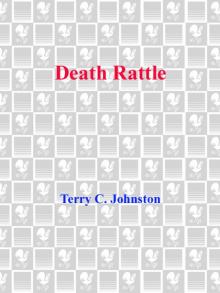 Death Rattle
Death Rattle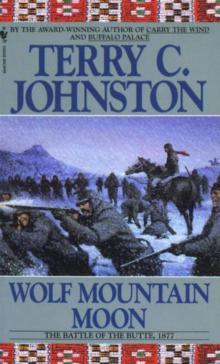 Wolf Mountain Moon: The Battle of the Butte, 1877 tp-12
Wolf Mountain Moon: The Battle of the Butte, 1877 tp-12 Crack in the Sky
Crack in the Sky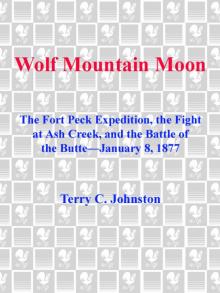 Wolf Mountain Moon
Wolf Mountain Moon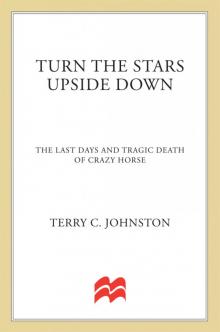 Turn the Stars Upside Down: The Last Days and Tragic Death of Crazy Horse
Turn the Stars Upside Down: The Last Days and Tragic Death of Crazy Horse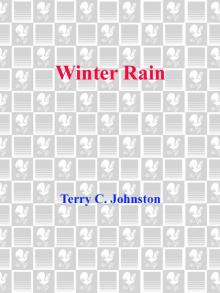 Winter Rain
Winter Rain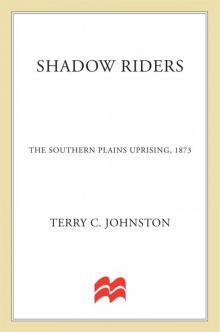 Shadow Riders: The Southern Plains Uprising, 1873 (The Plainsmen Series)
Shadow Riders: The Southern Plains Uprising, 1873 (The Plainsmen Series)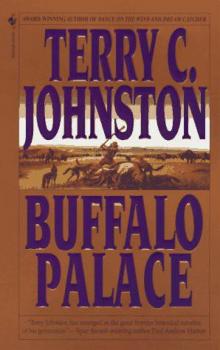 Buffalo Palace tb-2
Buffalo Palace tb-2 Cries from the Earth: The Outbreak Of the Nez Perce War and the Battle of White Bird Canyon June 17, 1877 (The Plainsmen Series)
Cries from the Earth: The Outbreak Of the Nez Perce War and the Battle of White Bird Canyon June 17, 1877 (The Plainsmen Series)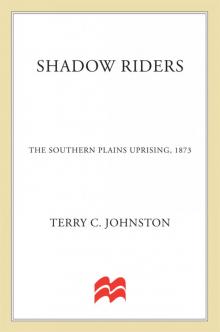 Shadow Riders, The Southern Plains Uprising, 1873
Shadow Riders, The Southern Plains Uprising, 1873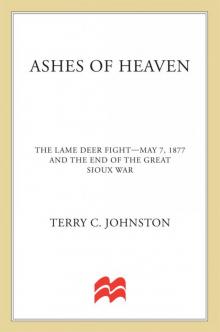 Ashes of Heaven (The Plainsmen Series)
Ashes of Heaven (The Plainsmen Series)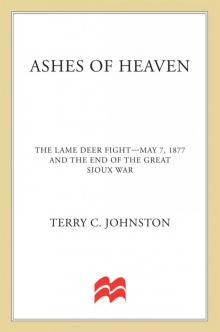 Ashes of Heaven
Ashes of Heaven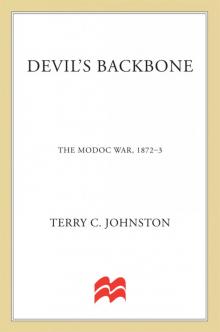 Devil's Backbone: The Modoc War, 1872-3
Devil's Backbone: The Modoc War, 1872-3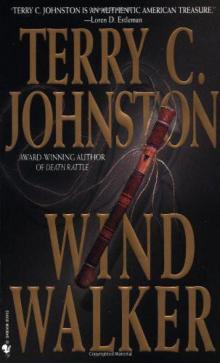 Wind Walker tb-9
Wind Walker tb-9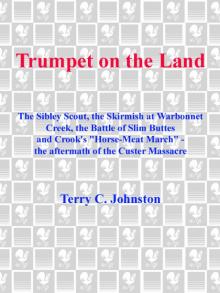 Trumpet on the Land
Trumpet on the Land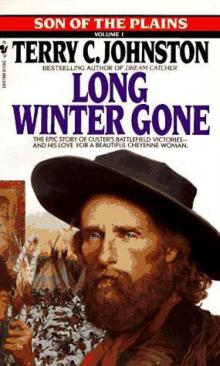 Long Winter Gone sotp-1
Long Winter Gone sotp-1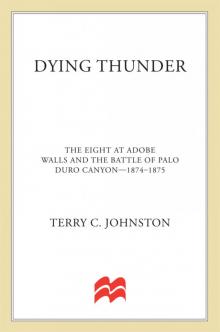 Dying Thunder
Dying Thunder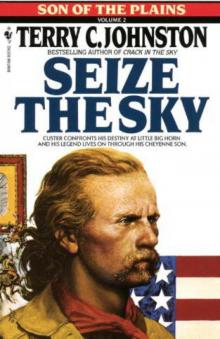 Seize the Sky sotp-2
Seize the Sky sotp-2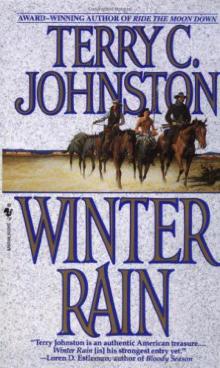 Winter Rain jh-2
Winter Rain jh-2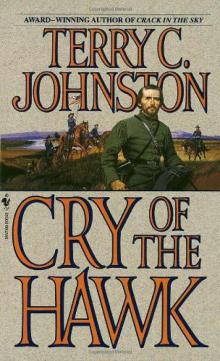 Cry of the Hawk jh-1
Cry of the Hawk jh-1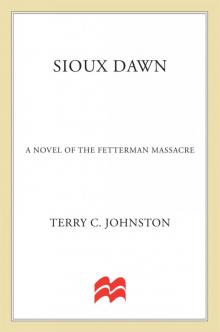 Sioux Dawn, The Fetterman Massacre, 1866
Sioux Dawn, The Fetterman Massacre, 1866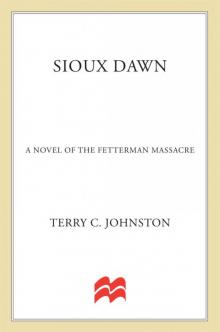 Sioux Dawn: The Fetterman Massacre, 1866 (The Plainsmen Series)
Sioux Dawn: The Fetterman Massacre, 1866 (The Plainsmen Series)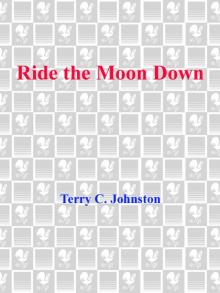 Ride the Moon Down
Ride the Moon Down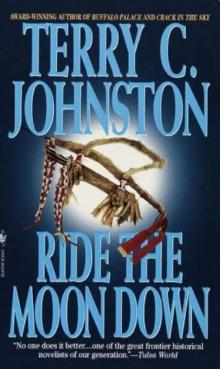 Ride the Moon Down tb-7
Ride the Moon Down tb-7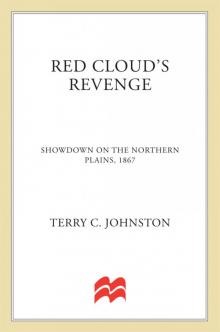 Red Cloud's Revenge
Red Cloud's Revenge Wind Walker
Wind Walker